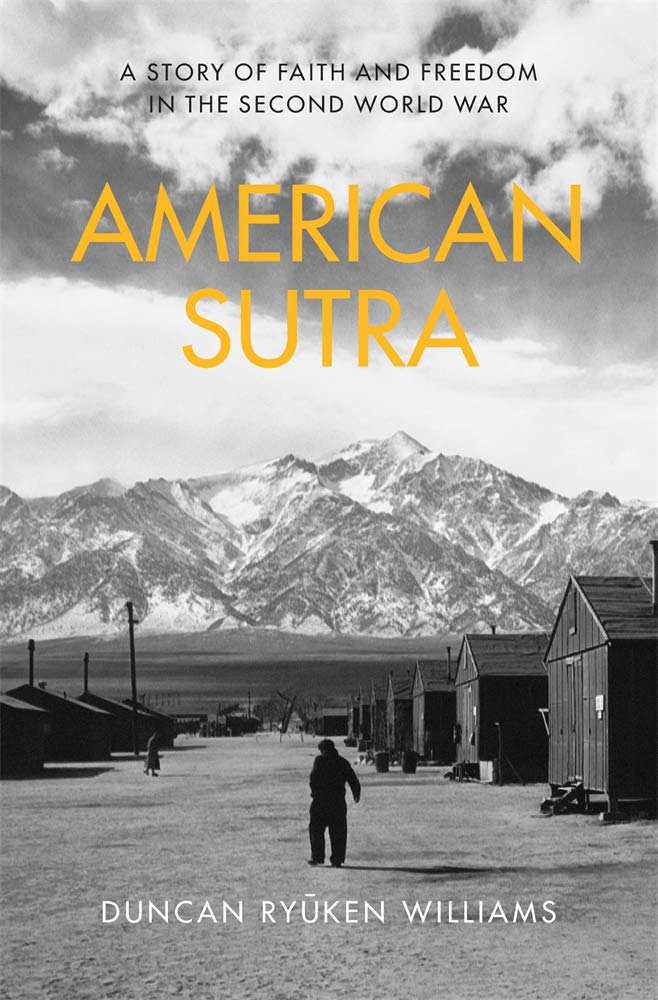American Sutra: A Story of Faith and Freedom in the Second World War
By Duncan Ryūken Williams
February 18, 2019
ISBN: 978-0674986534
In his groundbreaking new book, American Sutra: A Story of Faith and Freedom in the Second World War, author Duncan Ryūken Williams closely examines how religion and religious belief significantly impacted the degree of discrimination, abuse, and injustice Japanese Americans endured during World War II. Throughout the book, Williams shows us countless instances of how being both Buddhist and of Japanese descent immediately made one a target of hate, racism, and deep suspicions of “anti-American” sentiment by neighbors, communities, and the government alike.
However, American Sutra is not only an account of the several transgressions levied against Japanese American Buddhists during a time when being non-Christian and non-white essentially marked an individual as “un-American.” It is also an account of resilience, fortitude, and adaptation. Williams, through his poignant and detailed prose, shows how Japanese American Buddhists persevered through a time of monumental adversity, asserted their rights to freely practice their religion, and redefined what it meant to be both an American and a Buddhist simultaneously.
Organizing his book in a semi-chronological order, Williams begins American Sutra at the moment the Pearl Harbor attack occurred in Hawaii on December 7th, 1941. In these first chapters, Williams describes the beginnings of mass hysteria and discrimination against Japanese and Japanese American citizens across the Western United States after the attack, resulting in many losing their businesses, their homes, and their entire lives as orders for internment were being carried out. Those that practiced Buddhism, especially Buddhist priests, were particularly targeted, with several being rounded up and arrested immediately after Pearl Harbor despite no evidence of associations with the Japanese military.
Over the next few chapters, Williams tells stories of heartbreak, hardship, triumph and tenacity from within the internment camps, where over 110,000 Japanese and Japanese Americans were interned during World War II. He focuses on the particular roadblocks that Buddhists faced while in internment and recounts several attempts by those running the camps to discourage Buddhist practice, such as preventing Buddhists from booking community spaces to congregate for worship and banning most materials written in the Japanese language.
Despite these difficulties, Buddhist faith and practice persisted, and even thrived in the internment camps due to thoughtful adaptation. Different sects began to cooperate and co-host events, services were conducted in English, and more “Americanized” service books were created and distributed for use during worship services. One particularly moving story Williams recounts was of the creation of a monument called the Manzanar Ireitō in the WRA Manzanar camp in 1943. Both Christian and Buddhist ministers came together to create a monument that would honor those that had passed away while living in the camp, demonstrating a powerful moment of interfaith cooperation.
In his final chapters, Williams writes about the experiences of Japanese American Buddhist soldiers in the U.S. Military. Williams delves deeply into the conflicting emotions that several Japanese American Buddhists felt during this time, with several soldiers fighting for their country’s rights on the battlefield, while at the same time their country was stripping their family and friends of these very rights back home.
Throughout the entire book, Williams presents meticulously detailed, insightful, and moving personal accounts of Japanese American Buddhists living through incredible hardship. However, through these same stories, Williams also demonstrates how Japanese American Buddhists were able to overcome these obstacles, reclaim their identities as both Americans and Buddhists, and molded a new kind of “American” Buddhism that has survived to the present day.
American Sutra is a truly unique book, and a must-read for those that are not only interested in Japanese American history, but those that are also interested in the intersections of race, identity and religion in America.
Review by Jen Embree. Editing assistance by Jennifer Chan.

